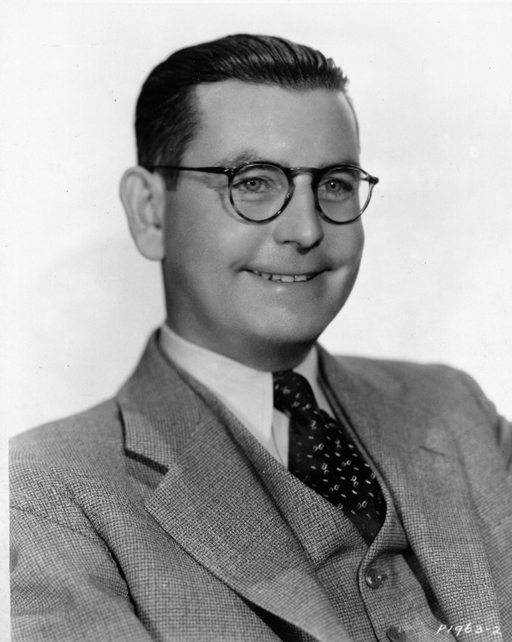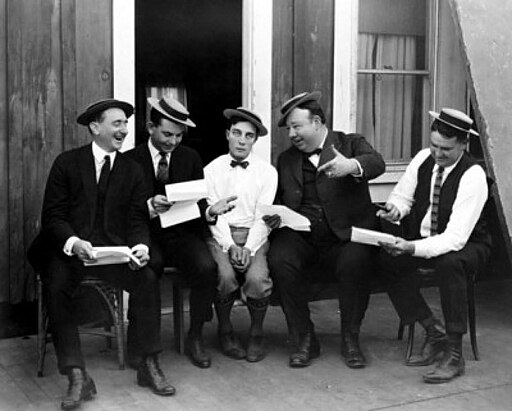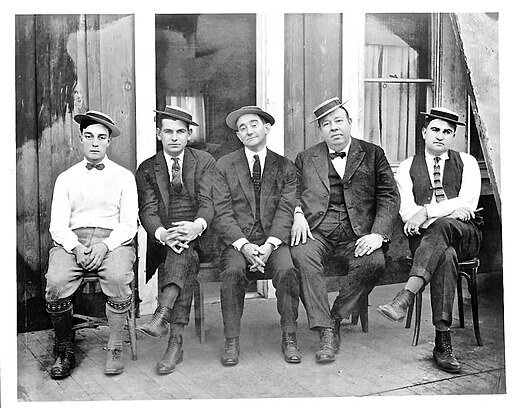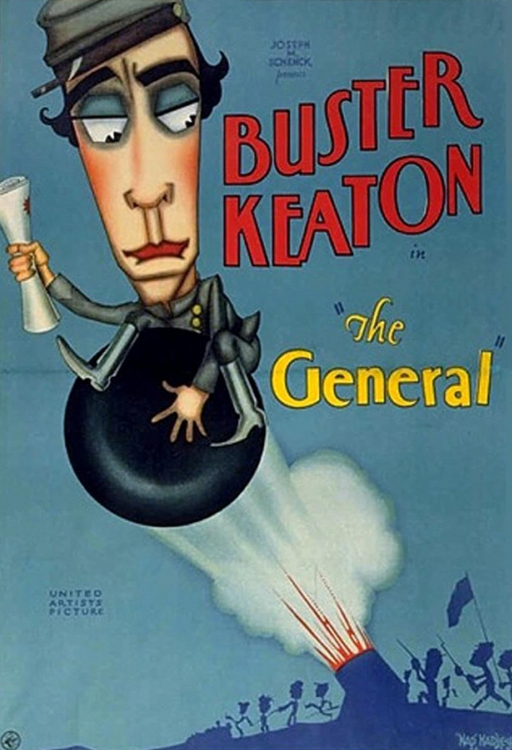Clyde Bruckman
back| Full Name | Clyde Adolf Bruckman |
| Born | September 20, 1894 |
| Birthplace | San Bernardino, California, USA |
| Died | January 4, 1955 |
| Buried | Bruckman's ashes were reportedly scattered in the Pacific Ocean |
| Married to | Lola Margaret Bruckman (1916–1931; her death) - Gladys Bruckman (1932 - 1955) - |
| Children | Not known |
| Notable films | The General (1926) - Our Hospitality (1923) - The Battle of the Century (1927) - Big Business (1929) |
Clyde Bruckman
Master of Slapstick
Clyde Bruckman was a pivotal figure in early American cinema, best known for his work with comedy legends like Buster Keaton, Laurel and Hardy, and W.C. Fields. A master of visual comedy and timing, Bruckman co-directed and wrote for some of the most iconic silent films, including "The General" (1926) and "Our Hospitality" (1923). Despite the lack of formal awards, his innovative storytelling and slapstick humor left a lasting impact on the film industry. Bruckman's career faced challenges in the sound era, leading to a tragic end on January 4, 1955.
Related
Clyde Bruckman (1894 – 1955)
Biography and Career Overview
Clyde Adolf Bruckman, born on September 20, 1894, in San Bernardino, California, emerged as a seminal figure in the silent and early sound eras of American cinema. Bruckman's journey into the world of filmmaking was not a straightforward path; like many of his contemporaries, he ventured into Hollywood with a blend of ambition and serendipity, finding his niche in the burgeoning field of comedy.
In the early stages of his career, Bruckman honed his craft under the tutelage and collaboration of some of the era's comedic giants. His ability to conceptualize and execute visual gags, combined with a sharp sense of timing, made him an invaluable asset behind the scenes. It wasn't long before he started working alongside Buster Keaton, a partnership that would produce some of the most celebrated classics of silent cinema, such as "The General" (1926) and "Our Hospitality" (1923). These films, marked by their ingenious blend of slapstick and narrative depth, showcased Bruckman's exceptional talent for comedy.
Beyond his collaborations with Keaton, Bruckman's versatility and creative acumen led him to work with other comedy legends, including Laurel and Hardy and W.C. Fields. His contributions to films like "The Battle of the Century" (1927) and "The Fatal Glass of Beer" (1933) further cemented his reputation as a creative force in comedic filmmaking. Through these collaborations, Bruckman displayed a unique ability to adapt to and enhance the distinct comedic styles of the era's leading stars.
Despite his professional successes, Bruckman's personal life was less publicized. The details of his marriage, potential children, and intimate relationships remained largely out of the spotlight, as was common for many individuals in early Hollywood. The industry at the time often kept a veil over the personal lives of its figures, focusing the public's attention on their on-screen and behind-the-scenes achievements.
Bruckman's later years were marked by struggles that reflected the challenges faced by many in the transition from silent to sound cinema, as well as the personal toll of a demanding career in the spotlight. On January 4, 1955, Clyde Bruckman's life came to a tragic end in Santa Monica, California. His death was a somber chapter that closed the life of a man who had brought laughter to millions. Following his death, Bruckman's ashes were scattered in the Pacific Ocean, a final resting place that symbolizes the vastness of his contributions to cinema, which remain timeless and universal.
Most Notable Films Directed by Clyde Bruckman:
Clyde Bruckman was primarily known for his work as a writer and sometimes as a co-director or assistant director, particularly on projects with comedy legends like Buster Keaton and Laurel and Hardy. While he directed a number of films, much of his most celebrated work comes from his contributions as a writer and creative collaborator. Below is a list of some notable films he directed or co-directed, along with a short synopsis for each. It's important to note that Bruckman's filmography includes significant work as a writer, which played a crucial role in shaping the films' success, even if he wasn't always credited as the director.
- "The General" (1926, co-directed with Buster Keaton): This silent comedy classic stars Buster Keaton as Johnnie Gray, a train engineer in the American Civil War. The film follows Gray's valiant efforts to rescue his beloved locomotive, "The General," and his girlfriend Annabelle Lee, captured by Union spies. Renowned for its elaborate action sequences and physical comedy, "The General" is considered one of the greatest films in silent cinema.
- "Our Hospitality" (1923, co-directed with Buster Keaton): Set in the early 19th century, this comedy-drama features Keaton in a feud between two families, the Canfields and the McKays. The film is celebrated for its pioneering stunts, comedic timing, and the elaborate train set pieces that Keaton navigates with his characteristic physical comedy prowess.
Clyde Bruckman’s Directing Style:
Clyde Bruckman's directing style, particularly evident through his collaborations with comedic legends like Buster Keaton and his contributions to the films of Laurel and Hardy and W.C. Fields, showcases a unique blend of slapstick comedy, innovative visual storytelling, and an acute sense of timing and rhythm. While much of Bruckman’s acclaim stems from his writing and collaborative efforts, his direction helped to crystallize the visual and comedic language of early cinema, particularly within the genre of comedy. Here's an analysis of key elements that define Clyde Bruckman's directing style:
Emphasis on Visual Comedy
Bruckman's work is characterized by a strong emphasis on visual comedy, leveraging the silent film medium's strengths to convey humor through action, expression, and situation without relying on dialogue. His ability to construct elaborate comedic sequences, which often involved complex physical stunts, showcased not only the actors' physical comedy skills but also his own ingenuity in staging these scenes.
Masterful Use of Timing
Timing is crucial in comedy, and Bruckman had a masterful touch in this regard. His films exhibit a keen sense of pacing, knowing precisely when to deliver a punchline or execute a gag for maximum comedic effect. This impeccable timing contributed to the enduring appeal of his work, making the comedic moments as effective today as they were nearly a century ago.
Innovative Storytelling Techniques
Bruckman was known for his innovative use of cinematic techniques to enhance storytelling, including creative transitions, imaginative uses of the camera to reinforce gags, and the integration of action sequences that were both thrilling and humorous. His direction often blurred the lines between comedy and drama, action and narrative, creating a seamless experience that was engaging on multiple levels.
Collaboration with Performers
A significant aspect of Bruckman's directing style was his collaborative approach with performers. Working closely with actors like Buster Keaton, Bruckman co-created scenes that played to the actors' strengths, particularly their ability to perform dangerous stunts with precision and comedic timing. This collaboration resulted in films that felt organically funny, with each gag and sequence feeling tailor-made for the performer's unique talents.
Legacy and Influence
Bruckman’s work has had a lasting impact on the film industry, particularly in the realm of comedy. His innovative techniques, from the complex choreography of physical comedy to the integration of narrative and action, have influenced generations of filmmakers and comedians. The films he directed or co-directed are studied for their artistic and comedic value, highlighting how ahead of his time Bruckman was in understanding the visual medium's capabilities.
No Awards but Bruckman’s Contribution to Cinema is Immense:
Clyde Bruckman, despite his significant contributions to the film industry, especially in the realm of comedy during the silent and early sound eras, does not have a well-documented record of awards and nominations in the same way contemporary filmmakers do. This lack of recognition can be attributed to several factors, including the era in which he worked and the nature of his contributions.
During Clyde Bruckman's most active years in the film industry (the 1920s and 1930s), the formal awards systems that we recognize today, such as the Academy Awards, were just in their infancy or did not yet exist. The first Academy Awards ceremony, for instance, took place in 1929, and the scope of categories and the breadth of recognition were quite limited compared to today's standards.
Bruckman's role in many of his films was often as a co-director, writer, or creative contributor, which further complicates direct attribution of awards specifically to him, especially considering that many of these roles were not distinctly recognized with awards at the time. His most notable works, such as "The General" and "Our Hospitality," are celebrated for their artistic and technical achievements and are considered landmarks in film history. However, they were not recognized with awards at the time of their release.
"The General," co-directed by Bruckman and Buster Keaton, has been retrospectively acknowledged as one of the greatest films ever made, earning spots on prestigious lists and being selected for preservation in the United States National Film Registry by the Library of Congress as being "culturally, historically, or aesthetically significant." However, this recognition and others like it are not awards in the traditional sense but are testament to the enduring legacy and influence of Bruckman's work.




